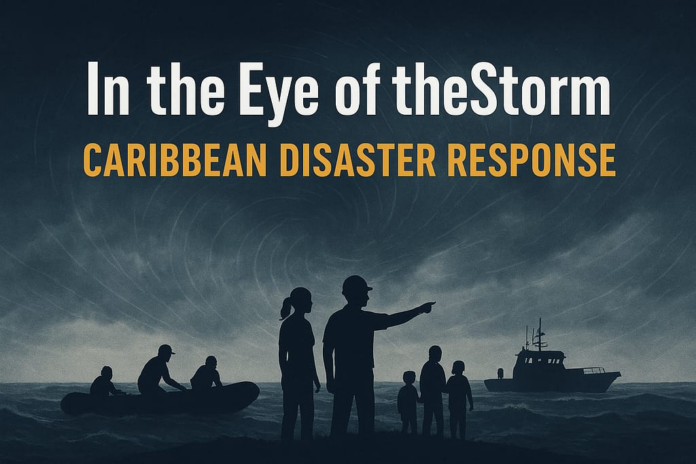In the Caribbean, where hurricanes, volcanic eruptions, and climate-driven displacement are constant threats, humanitarian action must be swift, inclusive and anchored in local leadership. With the 2025 Atlantic hurricane season already underway, the urgency is clear.
When national and community actors lead the disaster response and global partners stand firmly behind them to support the humanitarian response, recovery efforts become faster, more effective, and more likely to save lives.
This is the heart of World Humanitarian Day 2025 and this year’s campaign theme, #ActforHumanity a call to move beyond acknowledgment and take meaningful steps to empower local capacities, dismantle barriers to resources, and place communities in the driver’s seat of their own response and recovery.
The United Nations in the Eastern Caribbean has recognized the importance of bridging global humanitarian aspirations with local knowledge and partnerships.
The International Organization for Migration (IOM) has adopted this approach through its localization framework, which places the power, knowledge, and expertise of local actors at the center of humanitarian response.
This is particularly vital in Small Island Developing States (SIDS), where national agencies, public servants, non-government organizations (NGOs), and civil society organizations (CSOs) are often the backbone of resilience and recovery.
The lessons of recent history are instructive. In 2017, Hurricanes Irma and Maria devastated the Caribbean, with Barbuda rendered virtually uninhabitable and Dominica’s infrastructure shattered.
IOM and other UN bodies in Dominica joined efforts with village councils, community leaders, and regional volunteer organizations, who ultimately played leading roles in the recovery, ensuring aid reached the most marginalized who needed it the most.
In 2019, Hurricane Dorian struck the northern islands of Abaco and Grand Bahama in The Bahamas, sparking a remarkable wave of solidarity across the country.
The IOM co-led the shelter sector, with coordination meetings drawing more than 100 organizations, many of them local. Groups donated mattresses, water, house repairs, and arranged the transportation of locally donated relief supplies to NGOs and the government.
More recently, Hurricane Beryl in 2024 tested the region’s preparedness and adaptability.
The leadership of the Caribbean Disaster and Emergency Management Agency (CDEMA) and national disaster offices in Grenada and Saint Vincent and the Grenadines set the pace.
The Office for the Coordination of Humanitarian Affairs (OCHA), as the agency mandated to coordinate humanitarian action, in collaboration with the UN Resident Coordinator, supported CDEMA and facilitated joint UN efforts to ensure a coherent, needs-driven response.
IOM, as part of the UN response, aligned its efforts again with local and national authorities, distributing emergency shelter materials, supporting cash-based interventions, and deploying critical assessment tools.
IOM’s pre-positioning of relief supplies at the Caribbean Logistics Hub, in coordination with the European Union, Amazon, and the World Food Programme, enabled rapid response, but it was the networks of local responders and volunteers who ensured timely delivery to those most in need.
The Caribbean’s unique context demands a preparedness and response system that values inclusion, accessibility, and the agency of local actors.
Regional policy approaches of the Caribbean Community (CARICOM) and the Organisation of Eastern Caribbean States (OECS) ensure that no country faces disaster alone.
National disaster management organizations, supported by partner organizations, faith-based organizations, local businesses, and grassroots groups, bring context, trust, and innovation to every stage of the response.
The work of people with disabilities and their representative organizations has been vital for ensuring that disaster preparedness and recovery are truly inclusive.
Localization is not merely a policy—it is a practice.
The UN invests in building local capacity across the Eastern Caribbean, providing technical expertise to national mechanisms, supporting training in emergency coordination, and sharing data tools that strengthen response systems from within.
These efforts enhance, rather than overshadow, the leadership of national and community actors.
As we mark World Humanitarian Day, let us recognize the real heroes of the Caribbean’s disaster response: the public servants who work through the night, the NGOs and local organizations that never leave, and the regional bodies like CDEMA that unite countries in solidarity.
The future of humanitarian action in the Caribbean will be shaped by the courage and ingenuity of its people, and by our collective resolve to #ActForHumanity, and match their leadership with the resources and partnerships they deserve.
By: Jan-Willem Wegdam – Emergency Response Specialist (IOM)
Simon Springett – UN Resident Coordinator, Barbados and Eastern Caribbean


